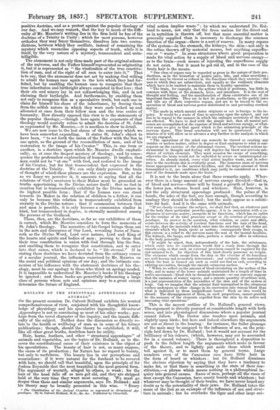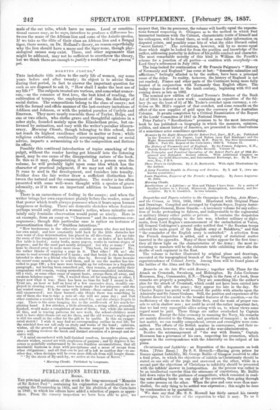HOLLAND ON THE STRITCTIINAL APPENDAGES OF ANIMALS. * ON the present
occasion Dr. Calvert Holland exhibits his wonted comprehensiveness of view, conjoined with his thoughtful knowledge of physiology and his speculative ingenuity. Structural Appendages is not so convincing as most of his other works; perhaps from the novel character of the inquiry, and the innate difficulty of the subject. Neither does the discussion so directly relate to the health or wellbeing of man as in some of his former publications ; though, should the theory be established, it will, like all other great truths, doubtless have its utility. Hair, horns, feathers, and other "structural appendages" of animals and vegetables' are the topics of Dr. Holland, as to discover the constitutional cause of their existence is the-object of his speculations. The beauty of hair is not, as many suppose, the cause of its production ; for Nature has no regard to beauty, but only to usefulness. The beauty lies in our perceptions and associations : if it were natural for the forehead to be covered with hair, we should call that beautiful, upon the principle of Sir Joshua Reynolds that the most beautiful is the most general form. The argument of warmth, alleged by others, is weak; for the hair of the head falls off as men get old, and they are stripped bald at the very time they want most covering. We must go deeper than these and similar arguments, says Dr. Holland; and Ins theory may be broadly presented in this wise. "Every • The Constitution of Me Animal Creation as ezpressed in Structural Appendages. By G. Calvert Holland, M.D., Ike. tze. Published by Churchill.
vital action implies waste " ; by which we understand Dr. Holland to mean, not only that the dross useless for the direct end as in nutrition is thrown off, but that more essential matter is generally supplied than is necessary to discharge the common function of the organ—there is a sort of reserve. In many o
of the system—in the stomach, the kidneys, the skin—not only the refuse thrown off by material means, but anything superfluous or "waste." In some structures where great preparation is made for vital action by a supply of blood and nervous energy— as to the brain—such means of rejecting the superfluous supply do not exist. But it must be got rid of, and in the case of the brain heir is the means.
"One class of organs may be regarded as gross in the nature of their productions, as in the formation of gastric juice, bile, and other secretions ; another may be viewed as refined in the functions whioh they exercise—the uses to which they are subservient, and equally so the residuary elements which have to be emitted to maintain them in healthy operation "The brain, for example, in the actions which it performs, has little in common with those of the stomach, liver, and intestines. It is the seat of thought and feeling, and the manifestation of them constitutes one of its important functions. They are in fact its productions, as the gastric juice and bile are of their respective organs, and are to be traced to the cooperation of blood and nervous power distributed to and pervading cerebral matter.
"The mode in which mental states originate or act is foreign to the inquiry. It would be a waste of time to speculate upon the subject, and not less so in regard to the manner in which the ordinary secretions of the body are effected. We have to deal with the simple fact, that all mental recesses are accomplished at the expense of blood and nervous energy, or whatever name we give to that agent which is the animating principle of the nervous tissue. This broad conclusion will not ho questioned. The admission of it will allow us to advance a step further in the analysis in which we are engaged.
"The operations of the mind can scarcely be viewed as creating any residue or useless matter, either in degree or kind analogous to what is consequent on the exercise of the abdominal viscera. The cerebral actions instrumental to thought and feeling will deprive the blood and nervous substance of certain elements. They must occasion the escape of something, otherwise the brain would not be enfeebled by severe or uninterrupted exertion. As already stated, every vital action implies waste, and in reference to the cerebrum this is evidently great. The immense mass of nervous tissue appropriated to the mental faculties, and the largo amount of blood transmitted to it, are conditions which may justly be considered as a measure of the demands made upon the brain."
It is not to the brain alone that these remarks apply. Wherever there is a large amount of nervous energy directed—that is, of blood and nerves—there will be found a growth of hair ; as in the lower jaw, whence beard and whiskers. Hair, however, is not the only structural appendage produced : the palms of the hands, the soles of the feet, are bare enough, though according to analogy they should be clothed ; but the nails appear as a substitute for hair. And it is the same with animals.
"If we closely examine the subject, we shall find that, on whatever part of the body these particular growths appear, it is in association with a copiousness of nervous matter, energetic in its functions, which has no outlet for the residue of its vital processes except in the creation of external appendages. In answer to the question, what relation, as cause and effect, exists between the activity of cerebral functions and the hair of the head, we reply, that the materials which enter into the structure of the latter are elements which the brain ejects as useless; consequently their escape, to this extent, is a relief to the nervous mass the seat of the mental faculties. The kidneys, the lungs, and the skin, perform a similar office in reference to the body generally. "It might be urged, that, independently of the hair, the substances, which enter into its constitution would fled a ready issue through the smooth scalp, so that such an external provision cannot be required for the end assigned to it. An objection of this kind clearly possesses no weight. The elements which escape from the skin in the exercise of its functions are well known and accurately determined ; and certainly the materials of which the hair is formed are such as could not find an exit, according to
existing necessities, through the smooth cutaneous surface. * * *
"When we reflect on the amount of blood circulating on the surface of the body, and in many of the lower animals maintained for a length of time in active movement—blood rich in chemical elements—we can scarcely suppose that the emission of watery vapour, and a minute quantity of carbonic acid, is a just representation of the necessities of the skin and of the system at large. Can we imagine that the arterial fluid transmitted to the cutaneous surface undergoes no other change in its conversion into venous blood than what is indicated by these insignificant losses? Such an idea would be absurd. The disengagement of them, in such proportions, cannot possibly be the measure of the elements expelled from the skin by its active and unceasing vital operations."
This is the merest outline of Dr. Holland's general views. The argument is directly pursued at considerable length with both sexes, and into physiological discussions where a popular journal cannot follow. The Doctor also touches upon animals, and. slightly upon birds ; but here and indeed elsewhere the arguments are not so direct in the bearing : for instance, the fuller plumage of the male may be assigned to the influence of sex, on the principle laid down by Dr. Holland ; but it would not account for the brilliancy of his colours, (which, however, may yet be accounted for in a second volume). There is throughout a disposition to push to the fullest length the arguments which make in favour of the theory, and. to lightly put aside those which would tell against it, or to meet them by general terms. Large numbers even of the Caucasian race have little hair III the form of beard or whiskers : but Dr. Holland dismisses the obvious objection by saying that they have a tendency to make fat, or that there is something in the state of their constitution,—a phrase which means nothing in a philosophical inquiry into general causes. Races of men, perhaps all the races of men except the Caucasian, have scanty beards and whiskers ; but whatever may be thmight of their brains, we have never heard any doubt as to the potentiality of their jaws. Dr. Holland takes the mane of the lion as an example of the influence of sex and structure in animals ; but he overlooks the tiger and other large ani
reels of the cat tribe, which have no mane. Local or constitutional causes may, as he says, interfere to produce a difference between the mane of the African lion and some of the Asiatic s cies. If we take as the elite of their class an African lion and a iienal tiger, there seems, on Dr. Holland's theory, no reason superficially why the lion should have a mane and the tiger none, though physiological causes may exist. These, and other arguments that might be adduced, may not be sufficient to overthrow the theory, but we think there are enough to justify a verdict of "not proven" yet.



































 Previous page
Previous page